September 13, 2001
This is my 9/11 story

This story is from my blog: streetstoriesems.com
On September 13, 2001, I was sitting around my union's office with several coworkers from different Brooklyn stations, awaiting transportation to Ground Zero. We were collectively living in a strange kind of haze after the biggest terrorist attack on our nation, and our city. We had been told to report to our union office if we wanted to assist in the rescue and recovery mission but no one there that day knew what to do with us at the moment. There was a row of telephones on a long table and one of them began to ring. I was the closest so I picked it up.
"Howdy!" said the friendliest voice I had heard in many days. "We're from a local in western Montana and we just need for one of you to give us the go-ahead to put our truck into drive."
Was this a wrong number? Who were they trying to get? What were all these phones for anyway? "Excuse me?" I asked. "I'm sorry, I'm just waiting here and picked up the phone. Who were you looking for?"
"Well, howdy again, ma'am," he said. He slowed his speech a little and his enthusiasm went down slightly, only slightly. "Your brothers and sisters in western Montana have loaded up an 18 wheeler, don't ask us how we got it, we ain't telling. We've got supplies and a few extra humans to help out our friends in NYC. Now, we've got this behemoth pointed east. Joe here, assures us he knows how to drive it. I'm not asking for the paperwork. All we are looking for is the go-ahead to move this thing forward."
He had put a huge smile on my face but I just automatically started crying. I was actually bawling, if we are being honest. I'll admit I was quite a bit sleep-deprived, which makes it fairly easy to turn on the tear spigot but that, I'm sure, only played a partial role. I was mostly filled with an overwhelming sense of love and gratitude towards this stranger on the other side of the country who had assembled supplies, volunteers, and even a very large truck under auspicious circumstances, apparently, just to help out people he had never met. I'm not sure what he thought when he heard me crying. "Don't worry, darling," he told me quietly. "Love always wins. It might take a while before the light gets shined upon it, but evil always takes a backseat to good."
I thanked him profusely for that, and for the mission he had set up. I told him I was in no position to authorize anything, that maybe he should call back later. But he didn't care. He felt that my answer indicated that his truck needed to hurry up and get to New York. They were just going to head east until they found us. He wanted us to know that help was on its way. I will never forget that phone call.
++++++++++++++++++++++
When the two airplanes struck each of the buildings of the World Trade Center I was working my other job at a cardiac monitoring service on Long Island. (Most of us work an additional job to support the job we are addicted to.) When news came that something huge was going on in downtown Manhattan, my boss rigged a television up and we all watched it together. Everyone there knew what I did at my other job and they all kind of just looked at me quietly. My then-boyfriend/future husband was working EMS and on the clock while all this was going on. I had some trouble getting in touch with him but our lieutenant (we worked at the same station at the time), told me he was 'probably' safe.
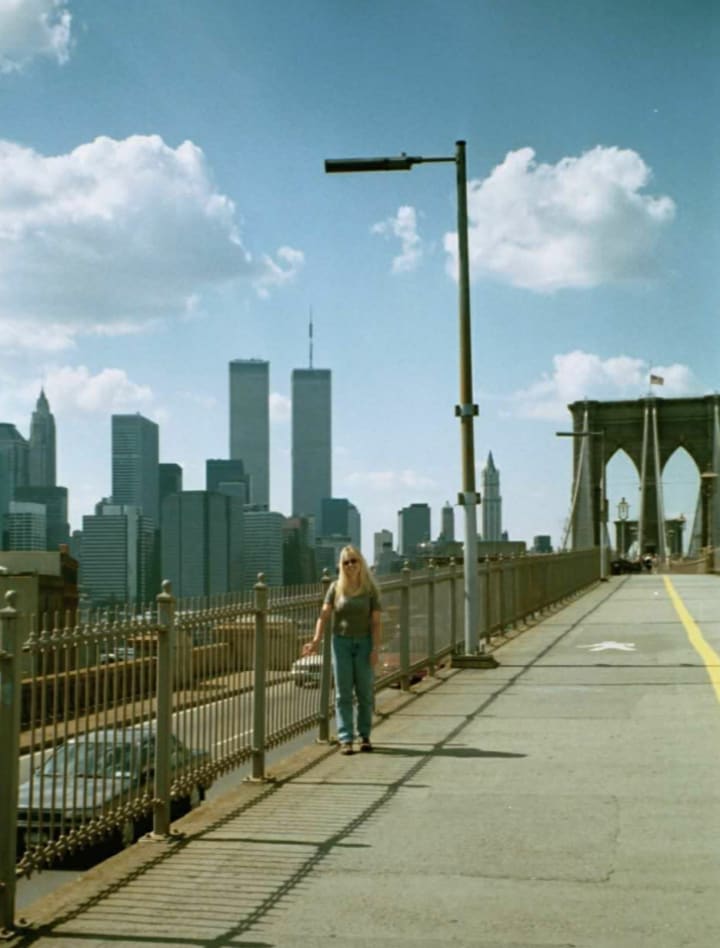
I was able to get a hold of my partner and he came and got me and we drove to the city together. Most of the roads towards the city had police roadblocks and we had to keep flashing our ID cards for much of the ride. We first went to our station to see what was being done from there. We also had ideas of picking up our equipment and heading to Manhattan, even though we were scheduled to work our unit that evening. Perhaps our unit would be sent. Everything was up in the air. I don't know what kind of planning was going on for that evening or the days ahead because it seemed that anyone in charge was in lower Manhattan and inaccessible.
For the time being, our lieutenant told us, we were to stand down. A city bus was on its way to take us to Manhattan. They were working out the scheduling and the logistics. Eventually, the bus arrived and we got on it. And then it was canceled. No more people would be going to Manhattan, the lieutenant told us. Too many units were there and not enough were covering the regular 911 needs of the city. So on the evening of September 11, 2001, my partner and I worked our usual truck.
It was a strange time to be doing your regular job. The entire city was in shock, as were we. I remember most things as if they happened in slow motion. Reports floated their way to the station of the names of people we might know, people who were missing. The call volume was higher than average but quite a few of them were calls of anxiety. Many people were hearing things, seeing things that turned out to be unfounded. We took some drunks to the hospital, many of whom didn't even know that a major disaster had taken place a few miles away.
I wondered about my sister, an air traffic controller, who must have worked her tail off to land all those planes. It's a stressful job to begin with, but on that day everything that was flying had to land, immediately or as soon as possible. You can find real-time air traffic images online to see just how daunting a situation that was.
We did our regular job again the next day too. Everyone was still feeling the effects of this major devastating event, even more so since more was known about it. So many people were missing, coworkers were missing. Several people I knew had already been confirmed dead.
It's difficult to do your job when you're an emotional tinderbox. There are drug dosages to calculated and protocols to remember. You've got to pay attention when you're driving. All the while you had to hold it together for everyone else despite more and more information pouring in, more names of the missing, more buildings. There were countless stories about people jumping off those buildings to avoid burning to death inside. You could only try to imagine the kind of desperation that takes. At the time it was thought that hundreds could be trapped in the rubble. To think about those poor people, desperately waiting for help, it was heartbreaking.
Our unit had developed a friendly relationship with Squad 252, which was in our area. We even had the code to the door, which surprised the firefighters that had been sent there to cover the firehouse. We had gone over to see how they were doing but the looks on the faces of the men there told us everything.
And yet I was still picking up drunks and people were still calling for colds that their antibiotics hadn't cured in three days. Normally those calls don't bother me. I often find them entertaining and they are a nice balance to the 'real' calls that involve suffering. But at that time there was nothing redeeming about calls like that, and there were so many of them, during the aftermath of a terrorist attack. Didn't they even watch the news?
Back then, I like many others, had no landline. I was living with a friend and the only phone line in the house was dedicated to dial-up internet. My then, high-tech brick of a phone had no service for more than a day after the attack and when it finally did come back it had a very limited range. I desperately wanted to get in touch with my family. I was able to call my mother in Florida after a few days but my dad in Hawaii would have to wait much longer. It was like we were back in the days before the industrial revolution. Most people were having difficulty with phone service and yet others were still able to call for an ambulance because their foot had a rash.
I cannot really describe how maddening this all was to me. When you deal with the onslaught of pain and suffering fairly regularly one of the biggest coping mechanisms is knowing that you tried and that you were able to help. Sometimes your efforts fail but the simple knowledge that you did everything you could makes all the difference in the world. There is also something to be said, something important, about keeping busy. But nothing we were doing was satisfying. Nothing seemed like 'helping'. It seemed like everyone wanted you to forget what was going on and just do what you used to do as if nothing had changed forever.
So on my first day off I wanted to head to lower Manhattan and dig. But you couldn't just drive over with your shovel and helmet. There must have been some organized efforts I could join, I thought. Or I would be one of the medical volunteers somewhere, I hoped. Anything. I would do anything.
But on the days previously, when I had been working, information about how to go about doing so was spotty and constantly changing. Initially, we had been signing up for extra ambulance shifts that would be dedicated to lower Manhattan but they had been canceled. I had tried to go over after and before my regular shift. (And I still had to pick up my car and the stuff I had left at my other job in order to try and accomplish these things). The best lead I had was to go to the union office as I had heard they were bringing groups of EMTs and paramedics to work ad hoc posts that had been set up. I had spent less than five hours at home in three days and I couldn't wait to go because I was desperate to assist in some way, anything, to feel useful because driving people to the ER for anxiety wasn't doing it.
A little ragtag group had assembled at the union office that day. I clearly had not been the only one who had heard this was the place to go. But the two people in charge at the office didn't know what to tell us either. Their information was also constantly changing. My then-boyfriend/future husband had gone to a different location where EMTs were being picked up to work at medical outposts that were being created. Paramedics were excluded, we were told, because paying us was too expensive (ridiculous given the sparse difference in our salaries). It seemed they didn't care that they had 'volunteers' who were willing to do things for 'free'. This was just more outrage, that in the middle of a nationwide tragedy the same silly nickel-and-dime rules were applying. There was just so much to be angry about. But then the phone rang, and I spoke to my new friend from western Montana.
I told the small group about the call and it empowered us to get up and go together. We had been given a placard and we got into one of their vehicles and made our way downtown, shovels in hand. Along the way the roads were lined with hundreds of well-wishers holding signs of encouragement, handing out water and snacks at traffic stops, and cheering us on. My hope for humanity was returning again.
Lower Manhattan was surreal. It had been two days after the attack and the air was still thick with a big white fog of particulates. It was really overwhelming and surprisingly quiet. Maybe it's just my slow-motion way of remembering it, but sounds seemed dull, the way your neighborhood feels when it's covered in a blanket of snow. We parked in an area where other vehicles had been assembled, ones that had been recently used, as opposed to the ones covered in white dust and debris. As we walked towards what was left of the trade center we would often see a random person, almost everyone was wearing some kind of uniform, and they would give you a somber nod that you would return in kind. I was struck by the lack of "stuff" in the debris. It seemed to be mostly building material, steel, and rubble. Two major office buildings had come down and there was a surprising lack of office equipment, crushed or in pieces. There was also no glass. I assumed it was a large part of what was making up the white fog.
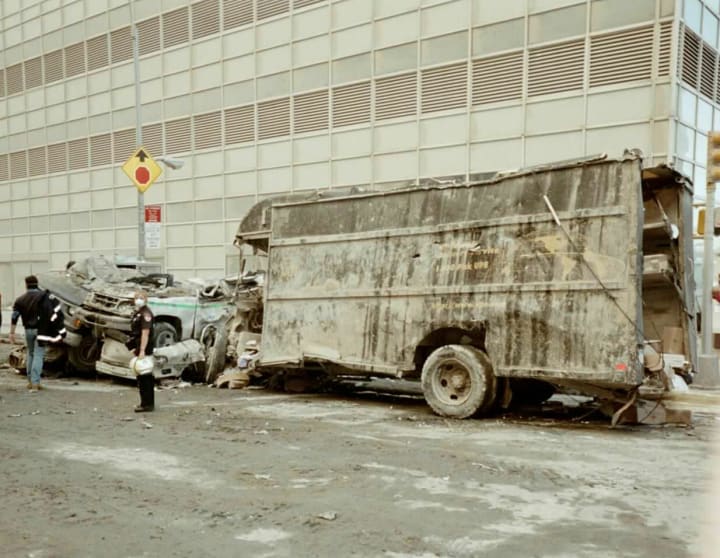
After only a block or two, our uniforms were already covered in dust. The air had a strange, acrid smell to it. At the first makeshift station we passed, we were handed an N95 mask, the kind I used to drywall my living room. At some point, later on in the day, I was warned by someone in a state uniform that my N95 mask was wholly inadequate and that I needed to get something better. "Where?" I had asked.
"Oh, we don't have any. Nobody does. But what you're wearing, it's not enough," he told me. He's the only one who said anything about it on any of the days I was there.
We walked around seeing different people in different places. It was comforting to see familiar faces of friends you hadn't been able to get in touch with. For this reason alone, I was glad to be there. We spent a good while walking around, taking in the new landscape. I snapped a few photos with my disposable film camera. It was numbing to see what was still standing and what had been crushed.

At some point, I volunteered at a medical station that had no medical people at it. Someone there begged me and one of my group to stand by until they found a dedicated crew. It was in the lobby of a partially destroyed building. About an hour later there was a sudden call to evacuate due to the instability of that building. My friend and I took off and went to look for someplace else we could be useful.
Much of the day consisted of stopping by, assisting, and then leaving when different orders came or new groups arrived. The amount of work ahead was, of course, insurmountable and it didn't feel as if we had accomplished anything of significance but it felt much better than pretending nothing was wrong and following the same routine we had been doing.
The one thing that does stand out among all the sadness and shock was the massive number of people who came to help. They too, I believe, felt that doing something was an important way to get past the helplessness one feels when something terrible has happened. So many individuals were donating their time, services, and resources. Massage tents had been set up, catering of all kinds was going on, there were tables set up with all sorts of donated articles- t-shirts, gloves, flashlights, socks, helmets, climbing gear, and so many other things, it overwhelms me to remember. And there were also the crowds, lining the roads leading to lower Manhattan. Access was blocked for most people and yet they found a way to participate and help. Their encouragement and positivity were a wonderful window of light in the dark room of our collective mental anguish.
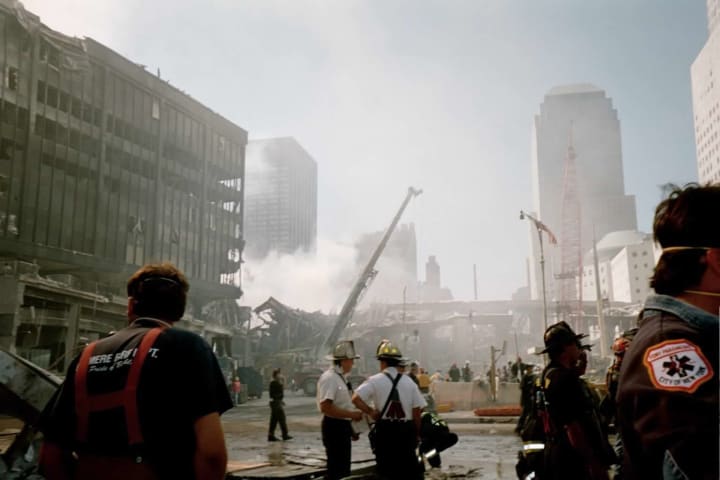
I went to the site a few more times over the next several months. Things became more organized, there were specific areas you could work, and eventually, even Ground Zero had became coordinated into a routine with procedures to follow and ways for things to be cataloged. The outpouring of love and appreciation from the public continued for a long time as well.
I never found out who the caller was on that day in the union office. I hope that he knows how uplifting his voice and his message were and how it meant far more than all the supplies they had managed to assemble in that short period of time. He was 100% correct about evil taking a backseat to good and he was definitely part of the 'good'
About the Creator
Nancy Gwillym
I'm a soon-to-be retired paramedic in NYC. I'm also a crazy cat/bird/etc lady who writes stories. Thank you for reading!
Enjoyed the story? Support the Creator.
Subscribe for free to receive all their stories in your feed. You could also pledge your support or give them a one-off tip, letting them know you appreciate their work.

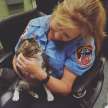


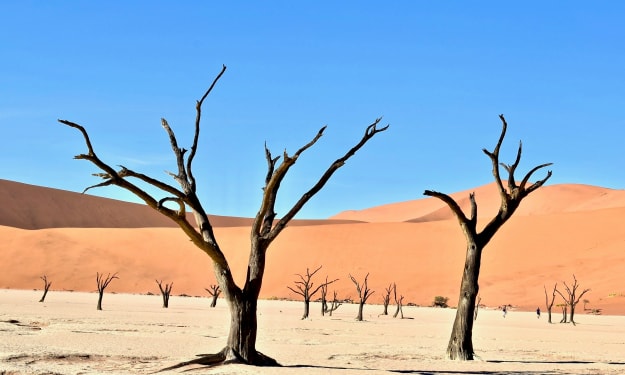


Comments
There are no comments for this story
Be the first to respond and start the conversation.